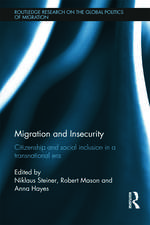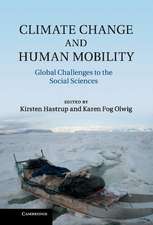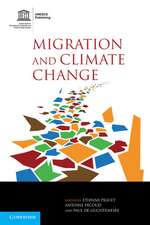The Consequences of Mobility: Reflexivity, Social Inequality and the Reproduction of Precariousness in Highly Qualified Migration
Autor David Cairns, Valentina Cuzzocrea, Daniel Briggs, Luísa Velosoen Limba Engleză Hardback – 20 feb 2017
This discussion will be of interest to those working within Europe’s mobility infrastructure, as well as policymakers in the mobility field and students and scholars from across the social sciences.
| Toate formatele și edițiile | Preț | Express |
|---|---|---|
| Paperback (1) | 577.72 lei 6-8 săpt. | |
| Springer International Publishing – 13 iul 2018 | 577.72 lei 6-8 săpt. | |
| Hardback (1) | 639.41 lei 6-8 săpt. | |
| Springer International Publishing – 20 feb 2017 | 639.41 lei 6-8 săpt. |
Preț: 639.41 lei
Preț vechi: 752.24 lei
-15% Nou
Puncte Express: 959
Preț estimativ în valută:
122.39€ • 132.99$ • 102.87£
122.39€ • 132.99$ • 102.87£
Carte tipărită la comandă
Livrare economică 21 aprilie-05 mai
Preluare comenzi: 021 569.72.76
Specificații
ISBN-13: 9783319467405
ISBN-10: 3319467409
Pagini: 188
Ilustrații: VI, 191 p. 1 illus. in color.
Dimensiuni: 148 x 210 x 13 mm
Greutate: 0.39 kg
Ediția:1st ed. 2017
Editura: Springer International Publishing
Colecția Palgrave Macmillan
Locul publicării:Cham, Switzerland
ISBN-10: 3319467409
Pagini: 188
Ilustrații: VI, 191 p. 1 illus. in color.
Dimensiuni: 148 x 210 x 13 mm
Greutate: 0.39 kg
Ediția:1st ed. 2017
Editura: Springer International Publishing
Colecția Palgrave Macmillan
Locul publicării:Cham, Switzerland
Cuprins
1. The Mobility Dream and its Consequences.- 2. Mobility Contexts.- 3. New Dilemmas in Europe’s Race for Global Talent: A Wrong Turn for Tertiary Education?.- 4. Working for Europe? Managing Erasmus+ in the Austerity Era.- 5. Recruiting Interns and Keeping them ‘Externs’: Mobility Paradoxes in Internship Governance.- 6. Being a Researcher: Professional Stability and Career Trajectories in Science and Technology.- 7. The Unsettled Future: Future Challenges in Highly Qualified Mobility
Notă biografică
David Cairns is Senior Researcher at the Centre for Research and Studies in Sociology, ISCTE-University Institute of Lisbon, Portugal, currently undertaking research on the Erasmus programme. He has published widely on topics including migration and youth studies.
Valentina Cuzzocrea is Lecturer in Sociology at University of Cagliari, Italy. She is also coordinator of the European Sociological Association RN 30 Youth and Generation and a member of the CoE/EC Pool of European Youth Researchers.
Daniel Briggs is Professor of Criminology at the European University of Madrid, Spain. His research includes work on social problems, deviance and migration. He is currently undertaking research on the refugee crisis.
Luísa Veloso is a Senior Researcher at the Centre for Research and Studies in Sociology, ISCTE-University Institute of Lisbon, Portugal. She is coordinator of the research line ‘Work, Innovation and Social Structures of Economy’, with numerous publications on the sociology of work.
Valentina Cuzzocrea is Lecturer in Sociology at University of Cagliari, Italy. She is also coordinator of the European Sociological Association RN 30 Youth and Generation and a member of the CoE/EC Pool of European Youth Researchers.
Daniel Briggs is Professor of Criminology at the European University of Madrid, Spain. His research includes work on social problems, deviance and migration. He is currently undertaking research on the refugee crisis.
Luísa Veloso is a Senior Researcher at the Centre for Research and Studies in Sociology, ISCTE-University Institute of Lisbon, Portugal. She is coordinator of the research line ‘Work, Innovation and Social Structures of Economy’, with numerous publications on the sociology of work.
Textul de pe ultima copertă
This book explores various forms of highly skilled mobility in the European Union, assessing the potential for this movement to contribute to individual and societal development. In doing so, the authors illustrate some of the issues arising from the opening up of Europe’s borders, and exposing its education systems and labour markets to international competition. While acknowledging the potentially positive aspects of mobility, they also reveal many of the negative consequences arising from flaws in mobility governance and inequalities in access to opportunities, arguing that when the management of mobility goes ‘wrong’, we are left with a heightened level of precariousness and the reproduction of social inequality.
This discussion will be of interest to those working within Europe’s mobility infrastructure, as well as policymakers in the mobility field and students and scholars from across the social sciences.
Caracteristici
Looks at the positive and negative consequences of European labour migration Focuses on key case studies from an international perspective Engages with theoretical debates form fields outside of sociology, including human geography















